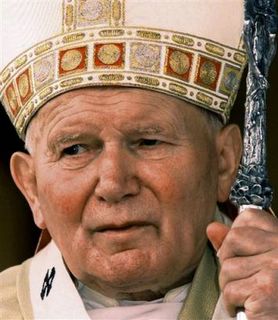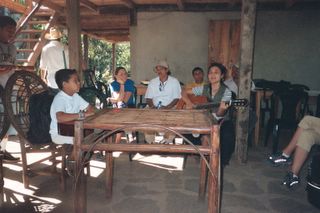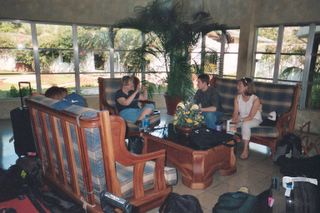Few Jews or Catholics appreciate how far one man went in redressing the wrongs of centuries. Looking into the early days of the late Pope, we find the roots of his friendship with the Jewish people.
Pope John Paul spoiled one of my favorite anecdotes. This may sound mean-spirited, but I can think of no greater tribute to the memory of a remarkable man.
Rabbi Yonoson Eybeschutz, one of the greatest Jewish scholars of the Eighteenth Century, stood as a young boy in the area in front of his house, peering over the fence at the pedestrian traffic. A local non-Jewish boor, half-drunk, couldn't resist the opportunity to take a pot shot at a Jew, even if he was a quarter his size.
"Hey, Jew!" he called to the boy. "What's the difference between a Jew and a pig?"
Little Yonoson did not have to think long to respond. "The fence, of course!"
This story speaks volumes of the relationship between Jews and non-Jews of that time in general, and the adversarial relationship between Jews and the Catholic Church — from whence flowed so much of the anti-Jewish venom — in particular.
Two Popes blunted the impact of that story, changing it from a definition of the present to a vivid description of the past. Both were affected, perhaps even radicalized in their relationship with the Jewish people, by the Holocaust.
Archbishop Angelo Roncalli helped save thousands of Jews as a Papal Nuncio, sometimes defying the policies of his superiors. As Pope John XXIII, he would preside over Nostra Aetate, which overturned centuries of Catholic attitudes towards Jews. Until then, Jewish-Catholic relations were a succession of footnotes to early Church leaders like Origen ("the blood of Jesus falls on Jews, not only then, but on all generations until the end of the world") and St. Cyprian ( "the Bible itself says the Jews are an accursed people .... the devil is the Father of the Jews.") Nostra Aetate made it Church teaching that the entire Jewish people of antiquity was not complicit in the crucifixion, and that Jews of subsequent generations should certainly not be saddled with any form of collective guilt.
What John XXIII did in the realm of theoretical teaching, John Paul translated into practical and unmistakable preaching by example. He did this with a flair for the dramatic, for the big moment whose eloquence did not fade when the crowds went home.
He was not only the first to visit a synagogue, but his embrace of Rabbi Toaf told of a willingness to reverse the antagonisms of two millennia. What he spoke went further yet, when he called Jews "our elder brothers of the Ancient Covenant never broken by G-d and never to be broken."
Many Jews, rightfully so, were skeptical of any warming up to the Jews that did not include an acceptance of the Jewish right to the Land of Israel. They assumed that the Church would be unwilling to part with its boilerplate reaction of so many centuries that saw the Jew wander in exile from place to place, banished from his Land for having rejected Jesus. The Pope did not mince words. He pointed to the debt that Catholics owed to Jews, and then drew his fateful conclusion. "The act of establishing diplomatic relations with Israel is simply an international affirmation of this relationship."
This attitude, as well, he turned into a succession of dramatic moments. He visited Israel. He made the pilgrimage to Yad Vashem. He said what Jews had bet no favorite son of the Church would ever say that the Church — meaning not only Christians, but Christianity itself — had to assume much of the blame for centuries of anti-Semitism, and for the Holocaust. As he put it, "the fact that anti-Semitism has found a place in Christian thought and teaching requires an act of teshuva", repentance.
He was certainly aware that teshuva connotes an active making of amends, not just the feeling of regret. How else to explain the prayer he composed asking G-d for forgiveness for Church crimes against the Jews, and the moving moment when he placed that prayer as a kvitel(petitioner prayer note) into the Western Wall in Jerusalem?
G-d of our fathers, You chose Abraham and his descendants to bring Your name to the nations: we are deeply saddened by the behavior of those who in the course of history have caused these children of Yours to suffer and asking Your forgiveness; we wish to commit ourselves to genuine brotherhood with the people of the Covenant.
He grew up in a town with 8000 Catholics and 2000 Jews; his best friend throughout his life was Jewish. He understood Jews — and the horrors inflicted upon them — as none among his successors will.
A Jewish perspective on the career of John Paul will look beyond the center-stage moments and find the small episode that says it all. Yaffa Eliach (Hasidic Tales of the Holocaust, pgs. 142-147) found it for us decades ago. (Click
HERE to purchase this truly incredible book. Sales help fund JWR.)
A Jewish couple in Cracow anticipated the worst, and entrusted their small son to a Gentile couple in the town of Dombrowa, who accepted the boy at no small risk to their own lives. The parents left directives to see to it that their son be raised Jewish and reunited with relatives in North America if they should not return.
They didn't, but the couple (who did not have children of their own) grew attached to the little boy. Over time, they decided to adopt him as their own, and asked the new parish priest to baptize him. The priest questioned the child's provenance. What had the parents said? The couple told him of their wish to have the boy sent to relatives across the Atlantic. The priest refused to baptize the child. In time, his relatives were located, and he was sent to them, and grew up to become an observant Jew.
The priest would later become Pope John Paul. When one of the most prominent pre-Holocaust Chassidic sages, the Bluzhover Rebbe, heard the story, he remarked, "Perhaps it was the merit of saving a single Jewish soul that brought about his election as Pope. It is a story that must be told."
As it turns out, it was an unfinished story. Perhaps it would not be inappropriate to see shades of the Talmudic maxim at work — "one mitzvah [religious act of compassion] drags the next in its wake." Karol Jozef Wojtyla's decision that day showed his acceptance of and regard for both Jews and Judaism. It led not only to his becoming the Pope, but to an unparalleled role in taking the Church to a different place in its relationship with the Jewish people. If both Catholics and Jews will study his teaching, if the story of the young Rav Yonoson Ebyeschutz becomes a relic rather than a reality, we will have created a memorial to him of that he would be proud.
Rabbi Yitzchok Adlerstein is the Sydney M Irmas Chair in Jewish Law and Ethics at Loyola Law School. He also coordinates intergroup affairs at the Simon Wiesenthal Center, and in that capacity has much more to say about the current state of affairs between Jews and many other faiths. Those curious enough to want to find out are invited to join him for Passover at the Hilton Torrey Pines in La Jolla, CA






